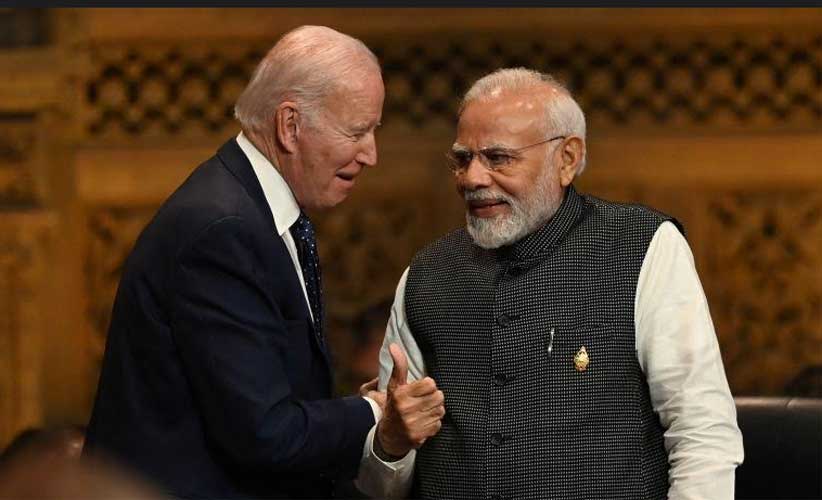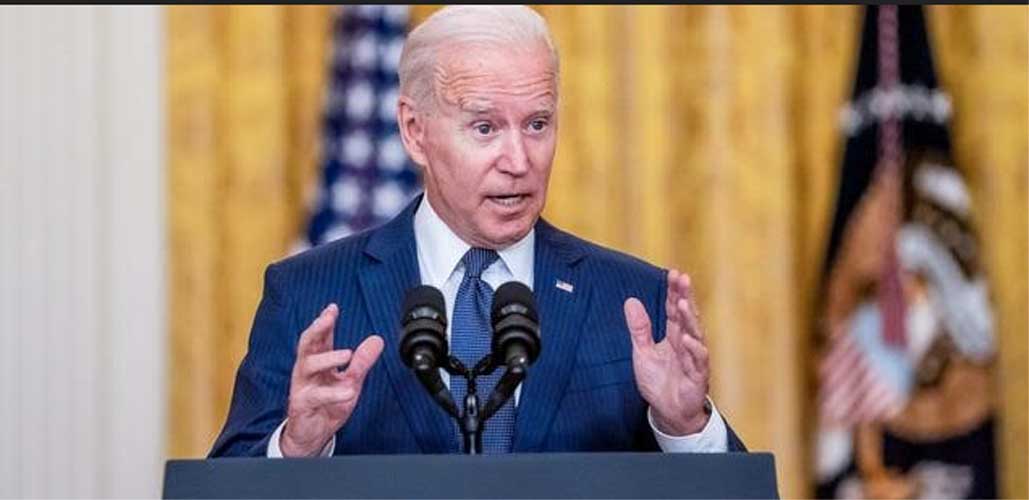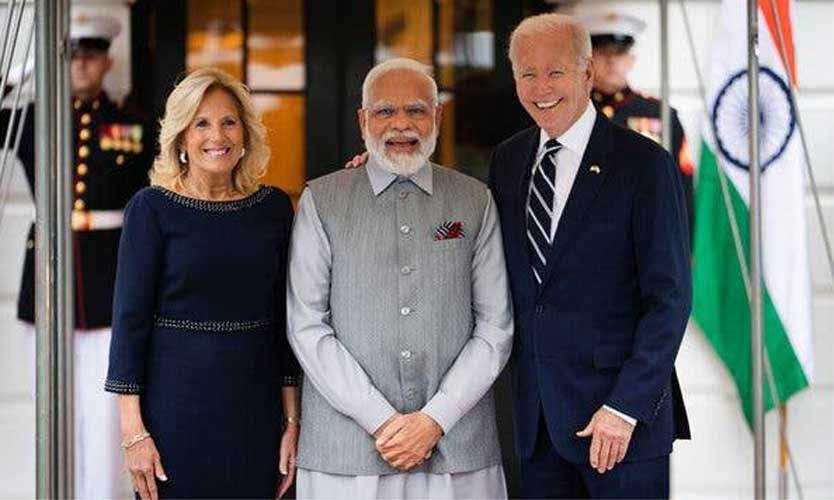By TN Ashok
Washington, June 23: While the White House rolled out unprecedented honours to Indian Prime Minister Narendra Modi with the joint session address to the Congress, and President Joe Biden calling it a solid Indo-US geo political cornerstone, the US media has offered a different take even as it described “ Modi’s visit as a diplomatic Prize for the Indian PM. For India is has the floodgates to access high technology in IT or Military denied so far by previous regimes — GE to manufacture jet engines for combat aircraft of Indian Airforce and Navy, Amry to use MQ state of the art missile armed drones. For PM Modi the US trip was a diplomatic coup and great success as US now wants to come closer to India even as 70 democrats rakes up the past about Baroda Riots and the human rights track records.

The visit is a significant diplomatic prize for Modi, once denied a visa to the United States for alleged role in religious riots in his home state, and as prime minister has increasingly consolidated power and edged his country closer to one-party rule, the New York Times observed in a review of PM Modis’s visit to the US, his joint address, only the 3rd accorded to a global leader, cementing defence ties, and sealing significant geo-political ties between the most populous and most powerful democracies in the world.
The US media , which took note of the memo circulated by some 70 Congressmen on the eve of his visit on reports of the track record on human rights, said the Biden administration has painstakingly taken steps to bring India closer, both economically and militarily thus rejecting all criticism of some congressmen, mostly republicans raking up the past and linking it to present on alleged violations of human rights.
More than 70 Democratic lawmakers urged the president in a letter to raise upholding democratic values and human rights with the Indian prime minister, citing “troubling signs in India toward the shrinking of political space, the rise of religious intolerance, the targeting of civil society organizations and journalists, and growing restrictions on press freedoms and internet access.” The White House virtually brushed aside the democrats memo.

The U.S. is trying to draw India closer.
The White House had prepped up Indian PM Modi’s visit to the US as celebrating “the warm bonds of family and friendship that link Americans and Indians together.” The White House noted that like his predecessors – Obama and Clinton — Biden had put immense trust in India, the world’s most populous democracy and the fifth-largest economy, to outbalance China’s growing global economic heft in South Asia.
“New Delhi has a pivotal role to play in checkmating China — if politically nudged, militarily helped and geopolitically encouraged by the U.S. and its allies,” the Times quoted Happymon Jacob, teaching Indian foreign policy at Jawaharlal Nehru University in New Delhi, as saying.
India has found itself at the centre piece of a jostling between USA and Russia in the latter’s invasion of Ukraine. PM Modi sent out a clear message that India always stood for peaceful solutions against war. India is doing a delicate balance while fostering closer ties with the United States, and maintaining military and economic relations with Russia — buying up Russian oil at a discount and staying away from backing United Nations resolutions that have condemned Russia’s aggression, the US media from NYT to Washington Post to CNN observed.
Defense cooperation was high on the agenda.
The United States made a massive outreach to India by allowing GE to manufacture jet engines for India’s combat aircraft and also selling the high state of the art MQ armed drones to the defence ministry in an apparent effort to boost its domestic defense preparedness against aggressive neighbours . This is seen by the US media as a major effort to wean India from its long standing commitment and dependence on Russia for its weaponry, which some defence experts have said is outdated .
Defense Secretary Lloyd J. Austin III and the national security adviser, Jake Sullivans’, visits to India prior to Modis visit is seen as laying the groundwork for closer defense partnerships.
The US media said a substantial part of India’s arsenal is estimated to be of Russian origin, mostly the result of both Republican and Democratic regimes that propped up an unreliable Pakistan against India to maintain geopolitical balance in the region. Pakistan harboured Osama Bin Laden who masterminded the 9/11 twin WTC blasts and was ultimately gunned down by US Navy seals in a night long drama that shocked Pakistan.
The US defence department is mighty concerned that India remains dependent on Russia for spare parts and maintenance of its military arsenal, though new political regimes have drastically reduced arms dependence on Russia.
Highlighting increased technological cooperation, military coordination and intelligence sharing between the two countries, Austin said during his New Delhi visit: “This all matters because we face a rapidly changing world. We see bullying and coercion from the People’s Republic of China, Russian aggression against Ukraine that seeks to redraw borders by force and threatens national sovereignty.”
The US media , particularly the Cable News Network (CNN), known for its liberal bias, observed that Indian PM Modi’s visit to the USA required President Joe Biden to make certain trade-offs and Modi to step out of his comfort zone, for at least a few minutes.
PM Modi is immensely popular in India, the CNN observed saying that however he had demonstrated a drift from democracy that had the West worried. Dissent, journalists with opposing views and human rights groups’ stand that the minority Muslims had been discriminated against had not gone down lightly.
Virtually ignoring the Congressmen’s memo and media’s reportage , President Biden had said in no uncertain terms that the US could not meet certain global challenges without India’s strong support on issues such as climate change to advances in technology, in an era of growing tensions between the US and China. India is the lynchpin for a strong democratic partnership that Biden is keen to cultivate, the US media reported.
Prime Minister Modi rebuffed all criticism, especially of the Congressmens’ memo against him on alleged discrimination, saying democracy runs in our veins. “It’s our DNA.” Later, the two leaders held a joint news conference. Normally Bidens call out reporters for questions, but Indian PM Modi, in an unprecedented move, chose to reply to a questioner. He responded to a question about his crackdowns on dissent and treatment of religious minorities.
“There’s absolutely no space for discrimination,” Modi said through a translator. ‘When you talk of democracy, if there are no human values and there is no humanity, there are no human rights, then it’s not a democracy.”
It was a remarkable moment for a leader, who does not hold news conferences, takes no questions from the press and hasn’t sat for an international interview, the US media reported.
Modi’s visit is only a third of the global leaders’ visit to the US during Biden’s presidency. The Indian Prime Minister’s visit had all the familiar trappings of US’s heightened hospitality towards a rising global leader and a nation that had become the most populous in the world overtaking China recently. Marching troops on the South Lawn, extensive Oval Office talks and a state dinner in the evening, complete with a chef who specializes in plant-based cuisine to accommodate Modi’s vegetarian diet was the hallmark of American diplomacy, report said.
“I’ve long believed the relationship between the United States and India … will be one of the defining relationships of the 21st century,” Biden said during an elaborate welcome ceremony during which he hailed the friendship between the US and India, the CNN reported.
